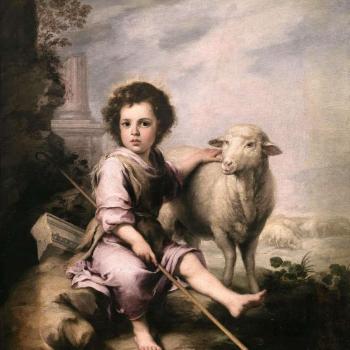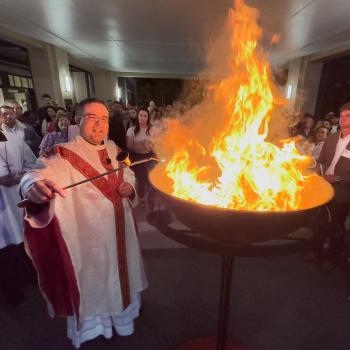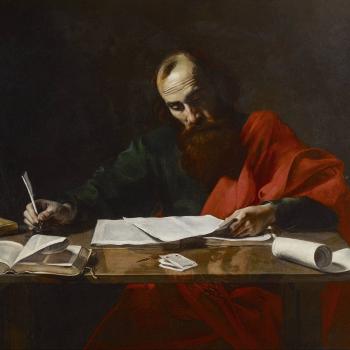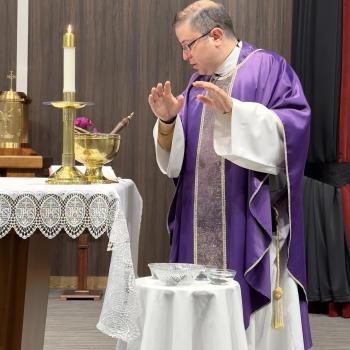Last week, the Gospel passage placed Jesus in the desert, hungry and tempted. We felt compassion for him; we experienced a glimpse of his humanity.
Today’s Gospel passage places Jesus on a mountaintop, dazzling and glorious. We feel excitement for him; we experience a glimpse of his divinity.
What a contrast. Is it contradictory? Not at all. Actually, you cannot have one without the other.
These two Gospel passages together describe the Lenten experience. Lent is a time to meditate on the fact that we cannot experience the transfiguration without first spending time in the desert. It is a time for us to experience here and now the dryness of desert so we may rejoice in the glory of the mountain top.
If I took a couch potato who sits in front of the television all day long and only eats junk food meal after meal to a soccer game and had him play, the site would not be very pretty. He would tire out in one minute and be unable to play.
To play a sport, you must first get in shape and exercise. Before going to battle, you must first get trained, before playing an instrument in public, you must first practice, and practice every day (as my piano teacher would tell me every week at my lesson).
In the same way Jesus prepared his soul for forty days in the desert, Lent is a time for us to prepare and train our own souls in order to be more faithful to the Lord throughout the year. As Jesus had to be strengthened before setting out on his public ministry, we too, can make this season of Lent a time to be strengthened.
We strengthen our will and our resolve to follow Jesus by making sacrifices and penances, offering something, even if small, to the Lord. In offering little things to God like ‘getting up earlier to say prayers’ or ‘not eating second helpings’ or perhaps ‘using facebook less’ or ‘eating no sweets,’ our will will be strengthened. If we can show restraint and say ‘no’ to small things, we will be ready to say ‘no’ whenever temptations overwhelm us and occasions of sin arise.
Being faithful to the Lord by offering him sacrifices will naturally lead us to the Transfiguration: a time when we intensely experience the blessings and joys that come from being reconciled with God and others.
No pain no gain.
The desert will lead us to the transfiguration, but the transfiguration then allows us to return to the desert full of hope and strength.
In the Gospel passage, the Transfiguration prepared the disciples for the trails they would soon face when Jesus was arrested and executed. The Transfiguration sustained them while thoughts of discouragement, despair and hopelessness arose. The Transfiguration was to remind them that there was hope in the darkness of Jesus’ crucifixion. The Transfiguration gave them the hope that allowed them to remain faithful till the resurrection.
The Transfiguration allowed them to survive the desert of Jesus’ passion and death.
When we feel the Lord distant, when we feel discouraged, we need to remember the blessings the Lord has given us in the past, we must return to the Transfiguration and remember we are never alone, because the Lord is always with us.
The Lord gives us the Transfiguration to give us hope throughout the journey of life which is oftentimes a desert. The transfiguration allows us to enter desert confident and unafraid.
Our lives are a constant movement between desert and transfiguration. At times we may feel as if we have one foot in each one.
This coming Thursday at 8pm Roman time, 2pm our time, Pope Benedict will retire as the Bishop of Rome and successor of Saint Peter. I truly believe this decision, announced two days before the
beginning of lent, set a very Lenten feel over the whole church. As a Church we feel sad that Benedict is in poor health and will no longer be our shepherd, yet at the same time we are joyful and hopeful that he has not made a hasty decision and that very soon we will have a new Pope.
Benedict has shown us that Lent is about letting go so that God may accomplish greater things in us and the world. Ultimately this is the Pascal Mystery of Christ: from death, the desert, comes life, the transfiguration, and that life allows us to bring life into the world and others.
















